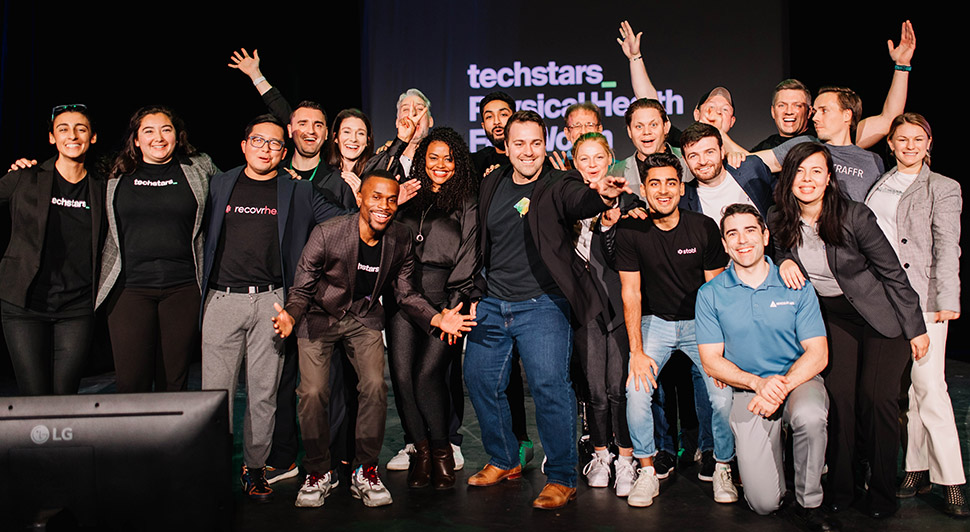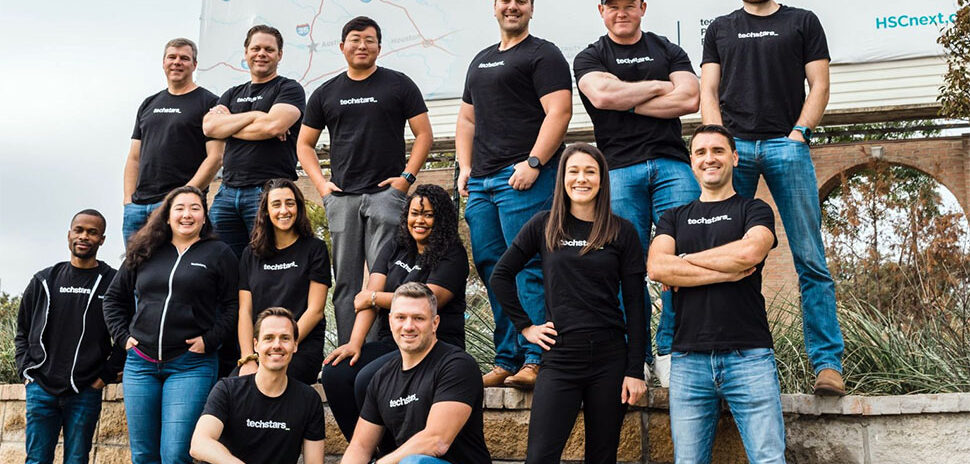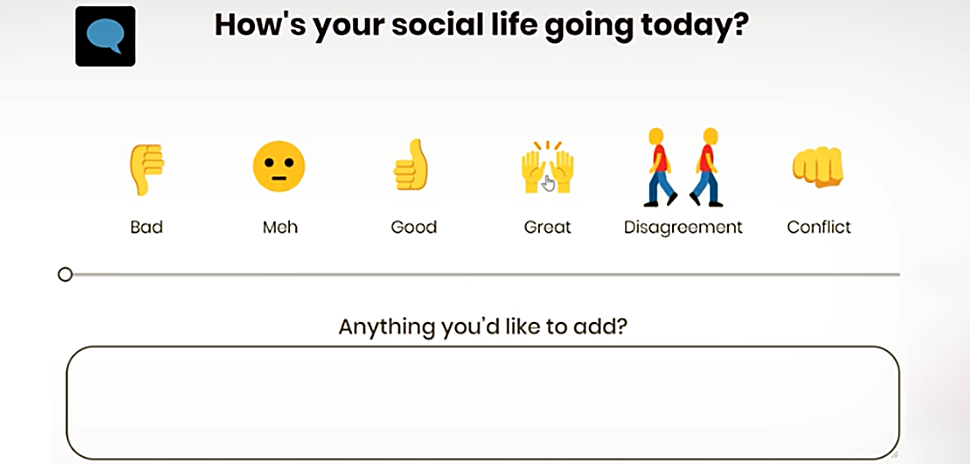They arrived in September from as close as Dallas and as far away as Toronto, Tampa, and San Francisco—and even a Swiss and German company were in the mix. The 10 startups took part in the Techstars Physical Health Fort Worth Accelerator, a first-of-its-kind partnership between the City of Fort Worth, Tarrant County, HSC, Goff Capital, and Techstars. And earlier this month, all 10 spotlighted their producers and concepts in a special Demo Day after 13 weeks of honing their technology.
The story began last February when Techstars announced its first-ever physical therapy accelerator, bringing the program to Fort Worth in a multi-year collaboration. The City of Fort Worth and Tarrant County directed $4.8 million in federal Rescue Plan Act funds to support the project in partnership with UNTHSC.
In September, Trey Bowles, the accelerator’s managing director, introduced the inaugural class of 10 early-stage startups taking part in the program, developing everything from medical devices to movement-tracking machine learning technology.
“There are a vast amount of resources that exist in North Texas for healthcare companies,” Bowles told Dallas Innovates at the time. “Bringing those together in a collaborative and concerted manner will be part of the evidence that proves that Fort Worth is the center of the universe for innovation in physical health.”
On Demo Day, the startups showed how they’re living up to the promise at the historic Isis Theatre in the Fort Worth Stockyards.
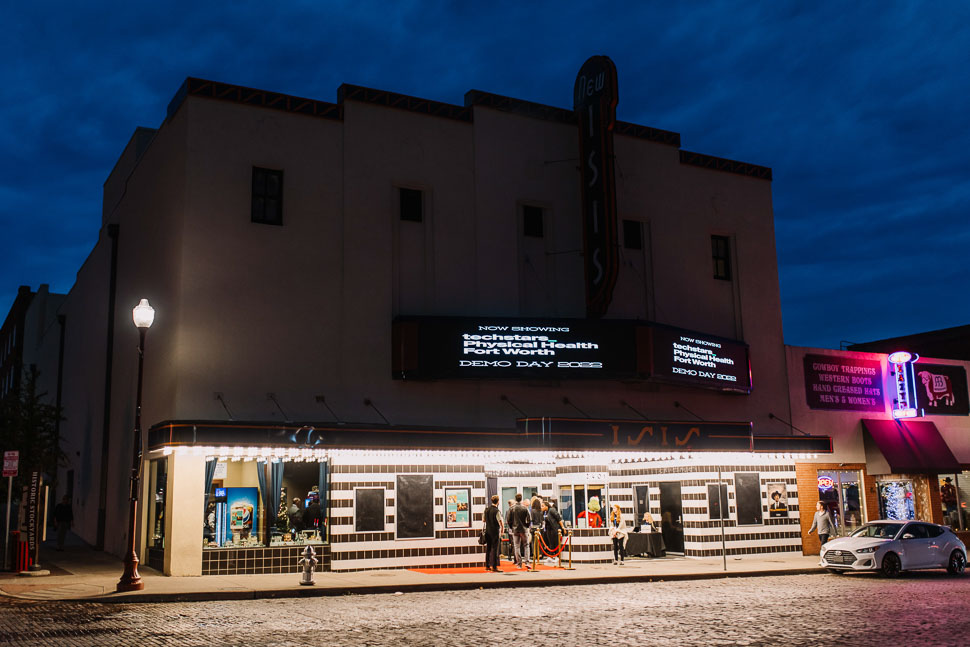
Setting the stage
“We searched the entire planet and talked to thousands of physical health founders to find the 10 most disruptive and innovative companies in health care,” said Trey Bowles at the event. “These founders and their companies have descended upon Fort Worth to break barriers, create the future, and live in the best city in the country to start, build, and grow a business.”
Fort Worth Mayor Mattie Parker, who helped launch the accelerator with a city hall event last February, spoke directly to the startup teams: “Helping to launch Techstars has been one of my proudest moments as Mayor of Fort Worth, and you’re the example for our future—the innovators that will be the next generation of pioneers,” she told them.
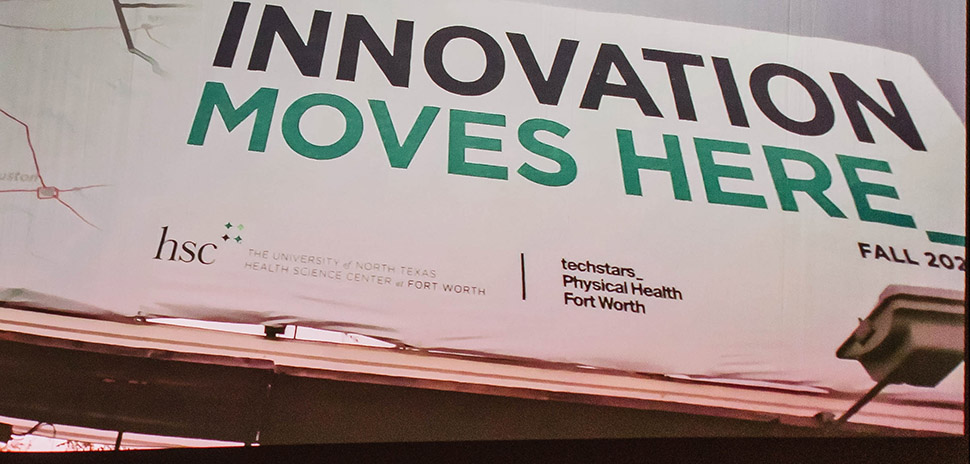
The 2022 Techstars Fort Worth cohort got its own billboard in Cowtown.
Robert McClain, associate VP in the Division of Research and Innovation at UNT Health Science Center at Fort Worth, pointed to HSC’s intense involvement with the program.
“At the Health Science Center, we’ve been walking alongside these entrepreneurs, introducing them to our faculty members, our resources, our students, and other partners that we have in the community,” McClain said. “We’re excited to see how they’ve grown just over the past three months.”
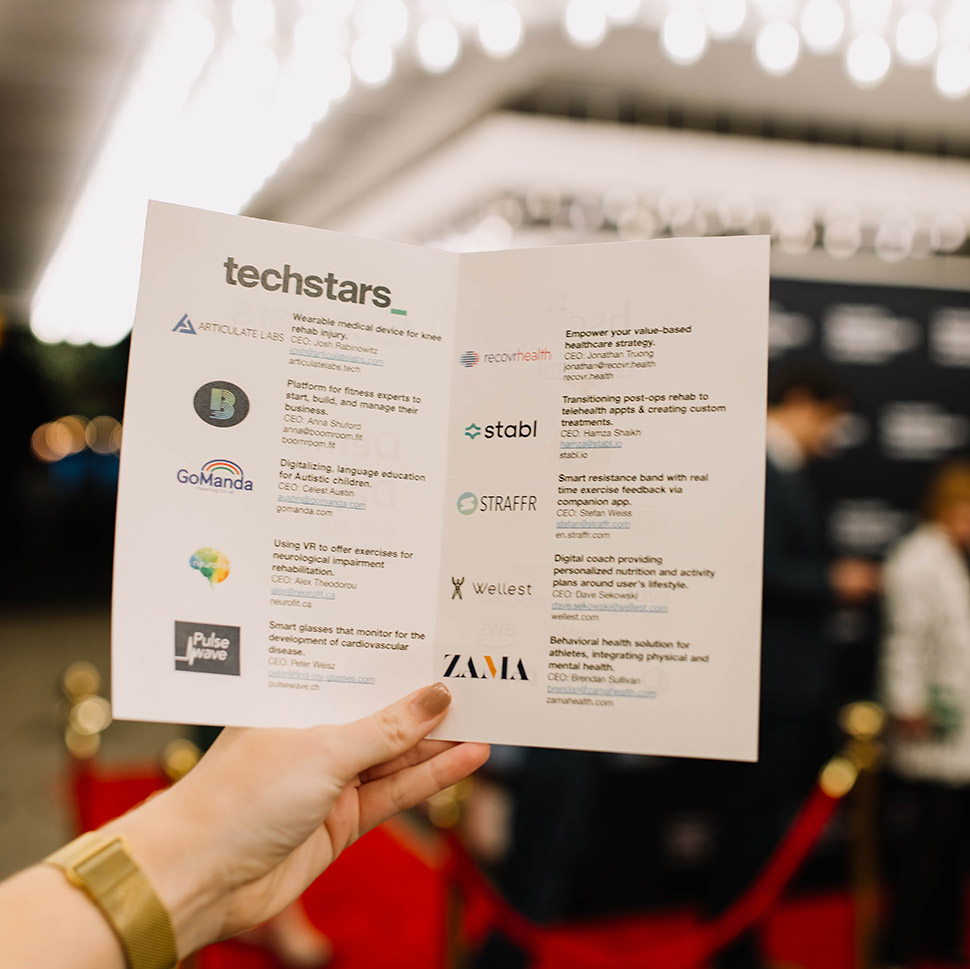
![]() Meet the Techstars Physical Health startups:
Meet the Techstars Physical Health startups:
Here’s a look at what each startup revealed—and where the future of physical health may be headed.
ZAMA Health
Washinton, D.C.
Founded 2021
Brendan Sullivan, CEO and co-founder
Mental health and sports psychology B2B SaaS platform
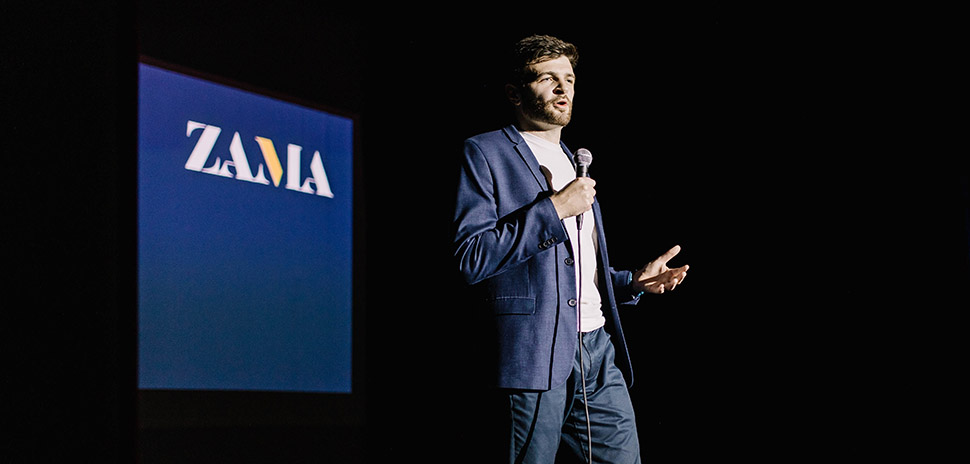
Brendan Sullivan, ZAMA Health
Brendan Sullivan, the CEO and co-founder of DC-based ZAMA Health, has experienced firsthand the crisis that athlete mental health is in.
As captain of the Yale track team, he had seen numerous teammates struggling with anxiety, depression, eating disorders, and even suicide. This issue extended far beyond competitive sports as it impacted all levels of athletes—from student-athletes to everyday gym goers and marathon runners, the former collegiate athlete says.
Psychological barriers such as the difficulty of getting out of bed for a morning workout keep millions from reaching their fitness goals, costing the gym industry billions each year.
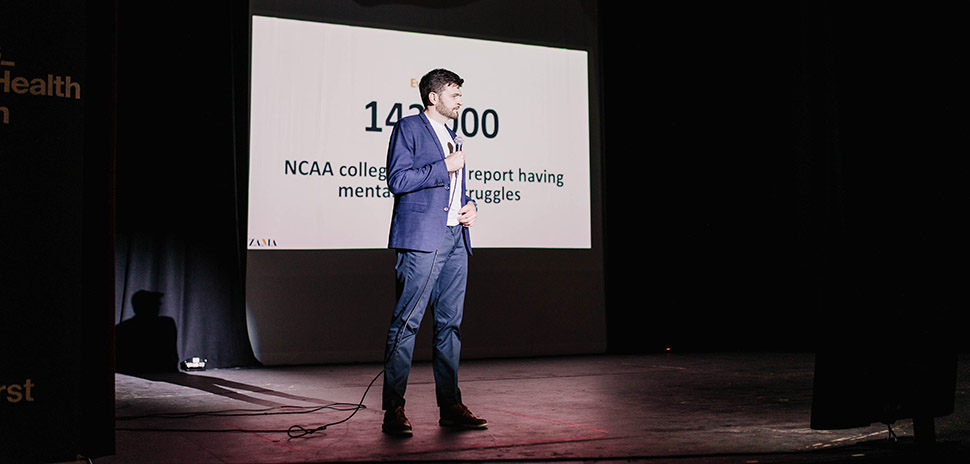
Brendan Sullivan, ZAMA Health
That was where Sullivan saw an opportunity to make a difference. He wanted to connect mental and physical health through data and clinical intervention to improve both physical and mental health as well as allow users to hit their fitness goals. Through partnering with gyms and sports programs, ZAMA Health could offer clinical services such as psychotherapy and medication management that would be integrated into their programs along with scientific validation by Dr. Jennifer Huberty leading their scientific efforts, who had been at Calm conducting studies that resulted in its multibillion-dollar success, he says.
“What excited me most about ZAMA was [Sullivan’s] focus on mental health in athletes,” said Huberty, formerly Calm head of science. “He’s targeting a population that truly needs resources.”
Huberty, who introduced Sullivan to the stage, noted the ZAMA founders are “definitely professionally equipped” to make the startup a “huge success,” she said. Sullivan’s co-founder was the former associate medical director at a New England inpatient eating disorder unit and general psychiatric unit.
Sullivan, who said the startup already “has realized $300,000 in revenue” was excited to announce multiple partners starting up in 2023, including a 30,000-member gym in California and an athletics program in Texas.
Fort Worth was an amazing home for the startup over the past few months, the co-founder said. “On behalf of our whole cohort, we wanted to extend our gratitude to the city of Fort Worth and all our partners for making this our home over the past few months. I know we’d love to find a way to make this a permanent home and at least keep part of our business operations here,” he said.
![]() Neurofit
Neurofit
Canada
Founded 2019
Alexander Theodorou, Founder and CEO of Neurofit
FitBit for the brain through a SaaS business model
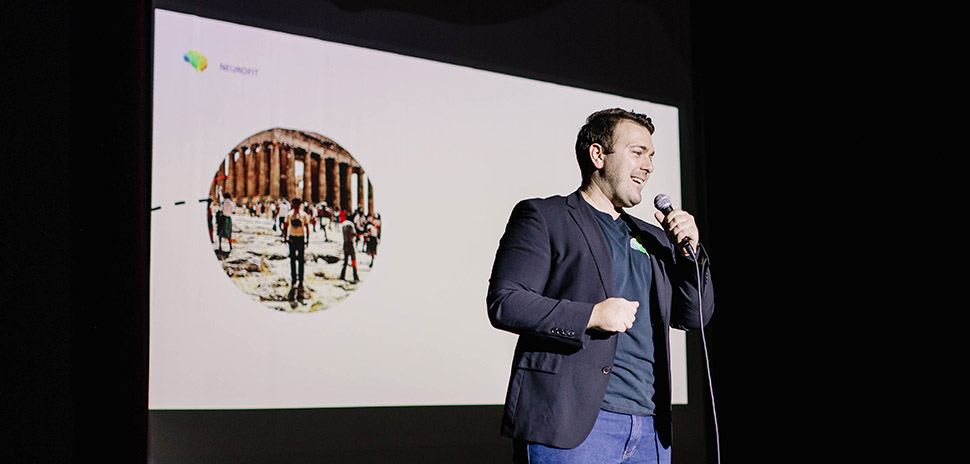
Alexander Theodorou, Neurofit
“My father was an amazing human being,” said Alexander Theodorou, founder and CEO of Neurofit. “He loved to travel the world. He ran a social organization that helped bring thousands of people together, all while taking care of me and my four siblings.” But in 2007, everything changed when he suffered a stroke. The right side of his body was paralyzed, leaving him unable to speak, walk or do the simple everyday tasks that we often take for granted, the founder said.
He attended neuro-rehab, which is designed to help restore the cognitive functions of the brain, says Theodorou. But he struggled with it, and eventually, he abandoned his treatments altogether.
He wasn’t alone: Research shows that one in five Americans need neuro-rehab in their lifetime and seven out of ten never complete their full plan of care, he says. “30 percent won’t even make it past their third session,” the founder said. “I’ve spent the better part of a decade solving this problem.”
It’s why Theodorou founded Neurofit, an innovative technology company designed to help providers give those who need it the care they deserve.
He describes a typical neuro-rehab treatment today: “Asa provider, you’re seeing around 20 different patients per week and scheduling up to 160 sessions per month. And then you have to customize each session around your patient’s individual needs. And the only tools you’re given to qualify patient progress include broad terms such as mild, moderate, or severe,” he said. “This makes tracking progress really, really hard.”
For patients, whose treatments last, on average 12 weeks, they have to schedule their life around their in-office sessions—and continue exercises at home, he says. “Long story short, staying motivated can be difficult,” Theodorou said.
Neurofit is designed to rethink the process: The startup’s software is accessible anywhere and uses algorithms to recommend exercises based on patients’ cognitive status. Progress is tracked and reported across several scientifically accepted data points so that providers can adjust treatments as needed.
“A provider will then receive these reports and adjust future treatments,” the founder said. “By using the Neurofit workflow, we’ve enabled providers to achieve an average completion rate of 90 percent. This is a 200 percent increase above the industry average.”
Theodorou has seen traction since its launch last summer: “We’re currently on track to hit $380,000 in revenue by the end of this year,” he said. “To date, we’ve partnered with 15 clinics, facilitated over 30,000 exercises, and helped over 240 patients.”
What’s next? With 50,000 clinics in the US alone, the founder says, “We’re just getting started.”
 NeurofitBoomRoom
NeurofitBoomRoom
Charlotte, NC
Founded 2020
Anna Shuford, CEO
Empowering fit pros with an online platform to service and provide revenue opportunities for trainers, physical therapists and fitness experts
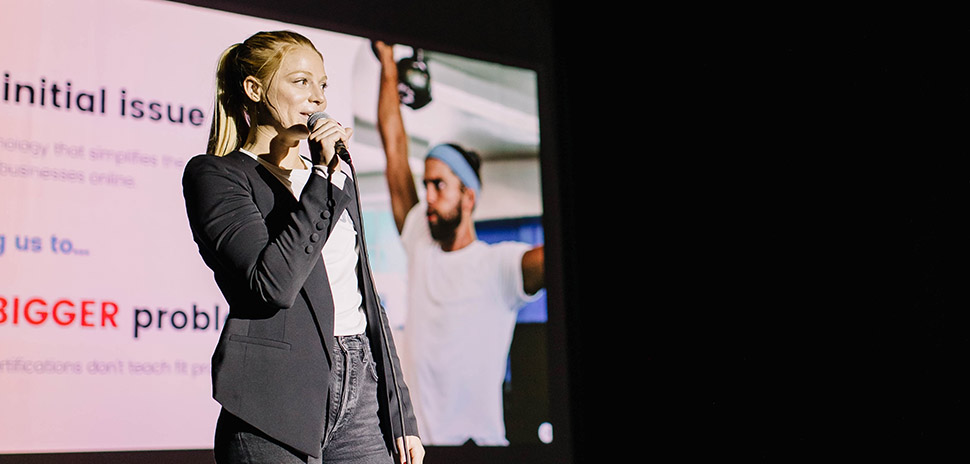
Anna Shuford, Boom Room
“On ‘day one’ of coming into Techstars, our key focus was to provide a platform that made running a business easy and accessible for any fitness professional trying to start something of their own,” said Anna Shuford, BoomRoom Founder and CEO. But that’s when Shuford uncovered an even bigger issue in the market: Fitness certifications don’t teach fit pros the necessary skills for running their own businesses.
“For our web-based platform to be successful, we realized that we needed to actually coach these people on how to build and run a sustainable business,” she said.
Shuford says fit pros need help with two major things: customer acquisition and customer retention, which are the two biggest factors that determine the health of their business. Enter BoomRoom, which wants to help create “thousands and even hundreds of thousands of fitness and wellness entrepreneurs who are using their own personal brands to redefine the space and create high-profit businesses of their own.”
With that in mind, Shuford and her team looked for ways to target micro-influencers, who have between 10,000 and 100,000 loyal followers. “Our goal is to help them maximize revenue per follower via personalized business coaching,” the founder said. “Our web-based platform takes care of the tedious work, allowing them to set up their offerings and start selling in minutes.” This hybrid approach has proven successful as they sold out their first business coaching program with an impressive 65% sales conversion rate. “Boom,” she adds.
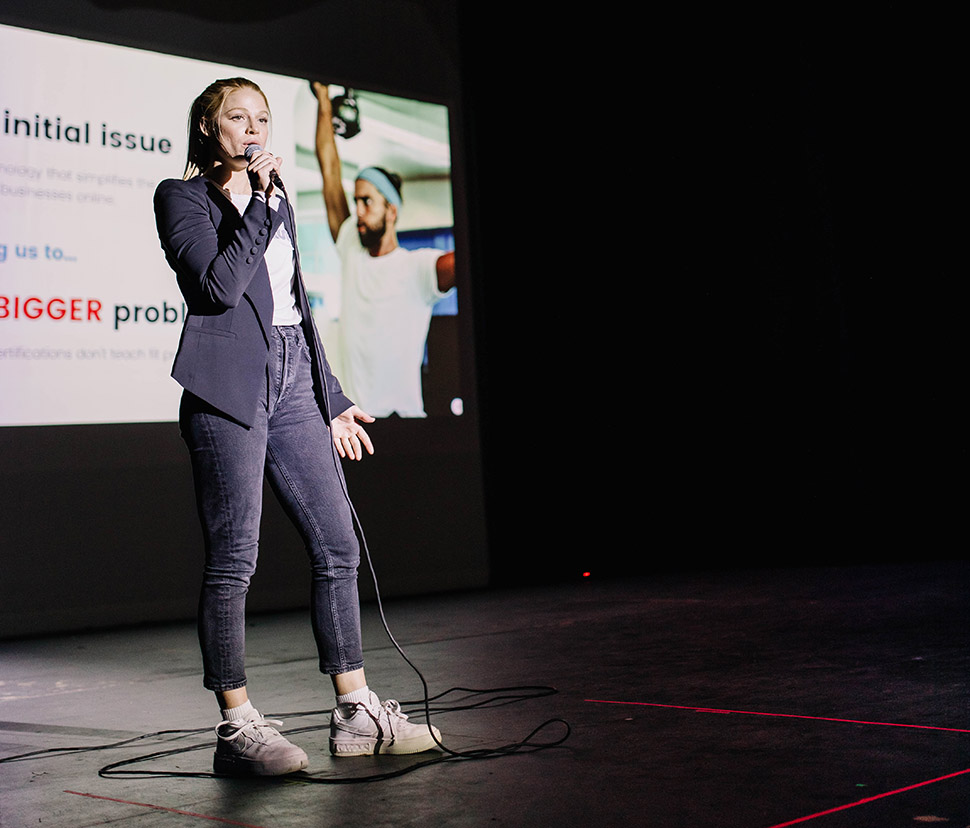
Anna Shuford, Boom Room
It’s a saturated market, the founder admits. But BoomRoom is targeting a unique segment within the market known as the fitness creator. Competitors in the space, she says, have all failed to recognize that technology alone doesn’t solve the full problem.”
Reinforcing its strong product market fit, BoomRoom’s next business coaching program is set to launch in February 2023 and already has a waitlist running due to huge demand from fitness professionals willing to invest in this innovative solution.
How does the company make money? “We pair a revenue share approach with a monthly or annual subscription, and we charge a one-time payment for our personalized coaching program,” Shuford said.
 Pulsewave
Pulsewave
Switzerland
Founded 2020
Peter Weisz, CEO
Wearable biosensor device worn conveniently and permanently with patients’ eyeglasses
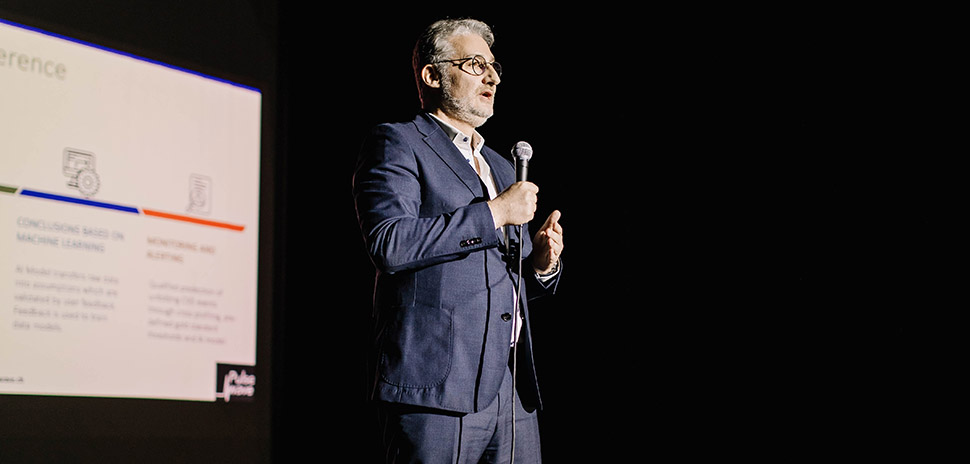
Peter Weisz, Pulsewave
Peter Weisz was determined to make a change. The past five generations of his father’s line had not seen their 65th birthday. “I’m here to change that, not only for my own family but for everybody,” he said.
Peter set out to improve the health-monitoring wearable devices currently on the market. And he wondered: Why do we leave vital sign monitoring to smartwatches when eyeglasses can do that much better?
“Last year, almost 1 billion health-monitoring wearable devices were sold on the planet,” he said. And some 87% are risk-based. Often, “devices are bulky, they are heavy, they’re not convenient to use, and very often abandoned,” he said.
And they’re expensive.
For example, when somebody goes to the emergency room to treat a cardiovascular disease, he says, it’s painful all around—including at the payor side. “In the US, it costs an average of $53,000, including after treatment,” he said. That’s when the after-treatment can actually become part of the problem — because after-treatment is inconsistent, he says.
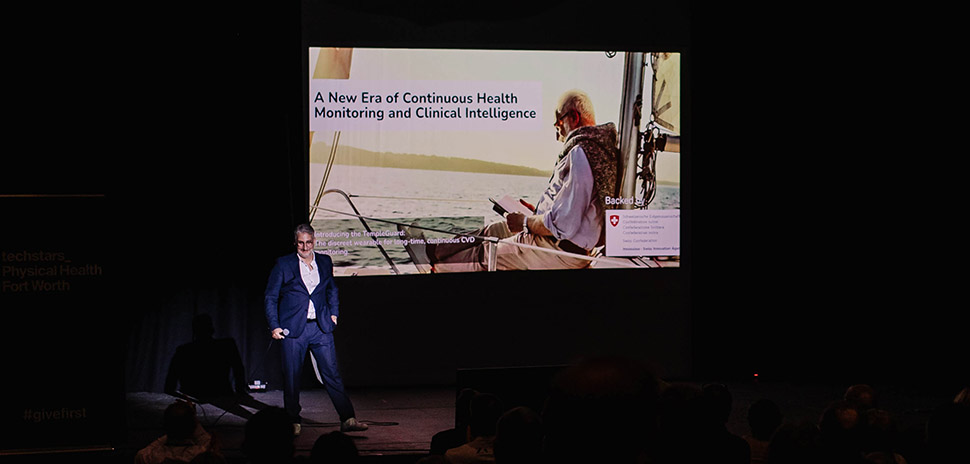
Peter Weisz, Pulsewave
Weisz noticed spots in the human body “where vital sign measurement can be done in a much better, much more reliable way.” One of those areas? The area behind the ear. The skin in this area was thin and without any hair growth, allowing Weisz to measure two spots, which, when compared to each other, made their measurements accurate and reliable.
The CEO says that makes eyeglasses a means of monitoring: In the US, 77 percent of those aged 55 and over constantly wear eyeglasses, and the figure increases to 83 percent for those over 65.
When his team discovered the massive potential of vital sign measurements behind the ear, it conducted extensive intellectual property research. “And our research showed, before we filed our own patents in December 2020, that the area behind the ear for vital sign measurements with people’s eyeglasses belongs exclusively to us,” the founder said.
The team also dug into the core business model, which is based on two surveys that it did online. “We made absolutely 100 percent sure that clinicians and practitioners have an interest to prescribe a discreet and convenient device which will measure vital signs all the time,” Weisz said. “We also conducted a survey amongst health insurance companies and asked them if they would be interested in reimbursing patients for wearing such a device, and the clear answer was ‘yes.’”
Weisz says the new device is his second wearable on the market. “That comes with some supply-chain experience, which is very important today,” he said. His team includes partner and CTO Aleksandr Shumilov, who has more than 15 years of experience leading development teams. Another partner is Brazilian Chief Data Scientist Adriele Rocha, with engineering experience from NASA, John Deere, and Airbus.
“Our signal strength is unprecedented in a wearable device,” he said.
Weisz and his group are developing its device to measure vital signs accurately, along with an app that asked questions about users’ histories and physical activity to determine their “so-called” risk group. The data can train machine learning algorithms, he says, to help ensure users wouldn’t be alerted for strokes or heart attacks if they were simply exercising on a treadmill at home, for example.
John Gauch, COO of Synervoz Communications, worked with Weisz over the past few months as an advisor in the program. He calls the four-time founder a “relentless and empathetic entrepreneur.” According to Gauch, PulseWave’s “breakthrough tech” has already achieved $800,000 in non-diluted funding from the Swiss government in an R&D partnership with Bern’s University of Applied Sciences
What sets the startup and its technology apart? “As opposed to all of our competitors, we are the only ones gathering vital signs from two independent spots in the human body, validating results with each other,” Weisz said. “We are the only ones analyzing and gathering a PPG signal from which we are able to derive heart rate, oxygen saturation, and blood pressure.”
 Wellest
Wellest
San Francisco
Founded 2027
Dave Sekowski, Founder and CEO
GPS for health: an AI Coach that optimizes your nutrition and activity around your lifestyle
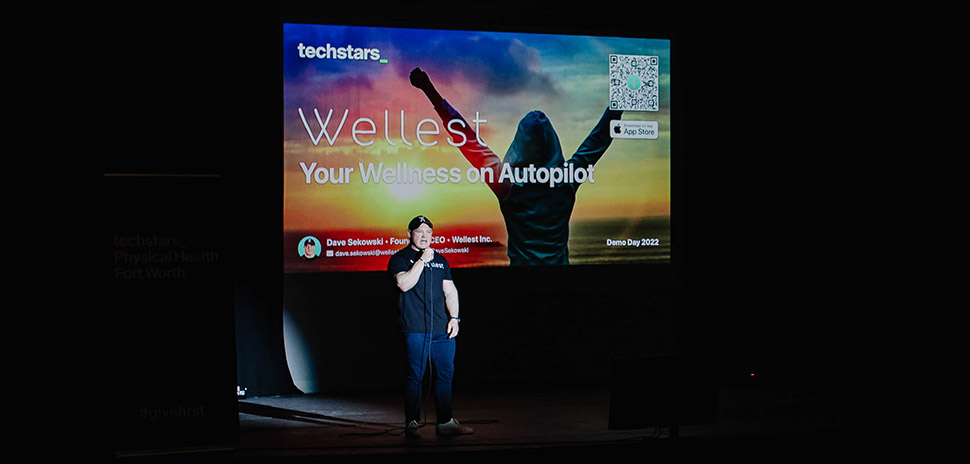
Dave Sekowski, Wellest
Dave Sekowski wants to make it easier for people to be healthy than unhealthy. As an ex-Apple and Intel product manager, Sekowski saw the potential that generative AI and innovative solutions could bring to healthcare. “We know that the thing that we don’t have enough of is time—and one of the few things that can give you more time is your health,” the founder said.
The former Apple Senior Technology Planner founded Wellest—a comprehensive health platform to manage every aspect of whole-body wellness: sleep, food, exercise, supplements, even prescription medications for patients and their healthcare team. He envisioned a platform that could reduce time, money and stress—and improve patient outcomes.
With that mission in mind, Sekowski set out on a journey to help people put wellness on autopilot through technology: “Very few people can manage the health concerns that are common in modern living,” he said.
But really, “this is about my mom,” the founder says. “She’s not going to get to meet her grandkids, she’s not going to get to see them grow up and start families of their own. And to be honest, I still need her, too. “
She died from an entirely preventable disease, Sekowski said. “She had elevated liver enzymes for over 20 years. But because she was a healthy weight and she didn’t drink alcohol, those were ignored.”
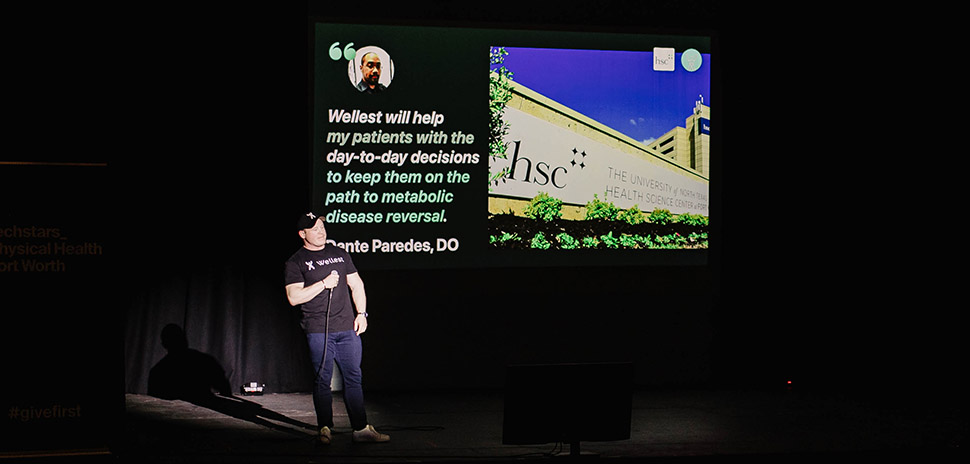
Dave Sekowski, Wellest
Yearly physicals and occasional bloodwork do not tell the entire story, he says. “93% of American adults are currently suffering from poor metabolic health that is leading to high blood sugar, blood pressure, and cholesterol culminating in deadly diseases like diabetes, heart, liver and kidney disease, even various cancers. It is truly the pandemic of modern living.
“There is nothing today that offers clinical quality metabolic care in a comprehensive way that increases the connection between patients and their healthcare team like Wellest does,” he said.
Sewkowski says Wellest uses a proprietary AI to combine various data points and create a personalized, easy-to-follow plan for every patient. As each patient makes progress, the plan adapts around them.
Using Wellest is like having a personal GPS for health, as it provides real-time tracking, planning, and coaching from the comfort of a phone, he notes. It knows where people are, where they’re going, and how to get there. Directions can adjust automatically in real-time to stay on track.
For doctors, Wellest lets them set goals and automate treatment plans “that are as unique as each of their patients is” — and increase the visibility they have into their patients’ lives between appointments. The idea is to help them make better decisions with better data in less time, he said.
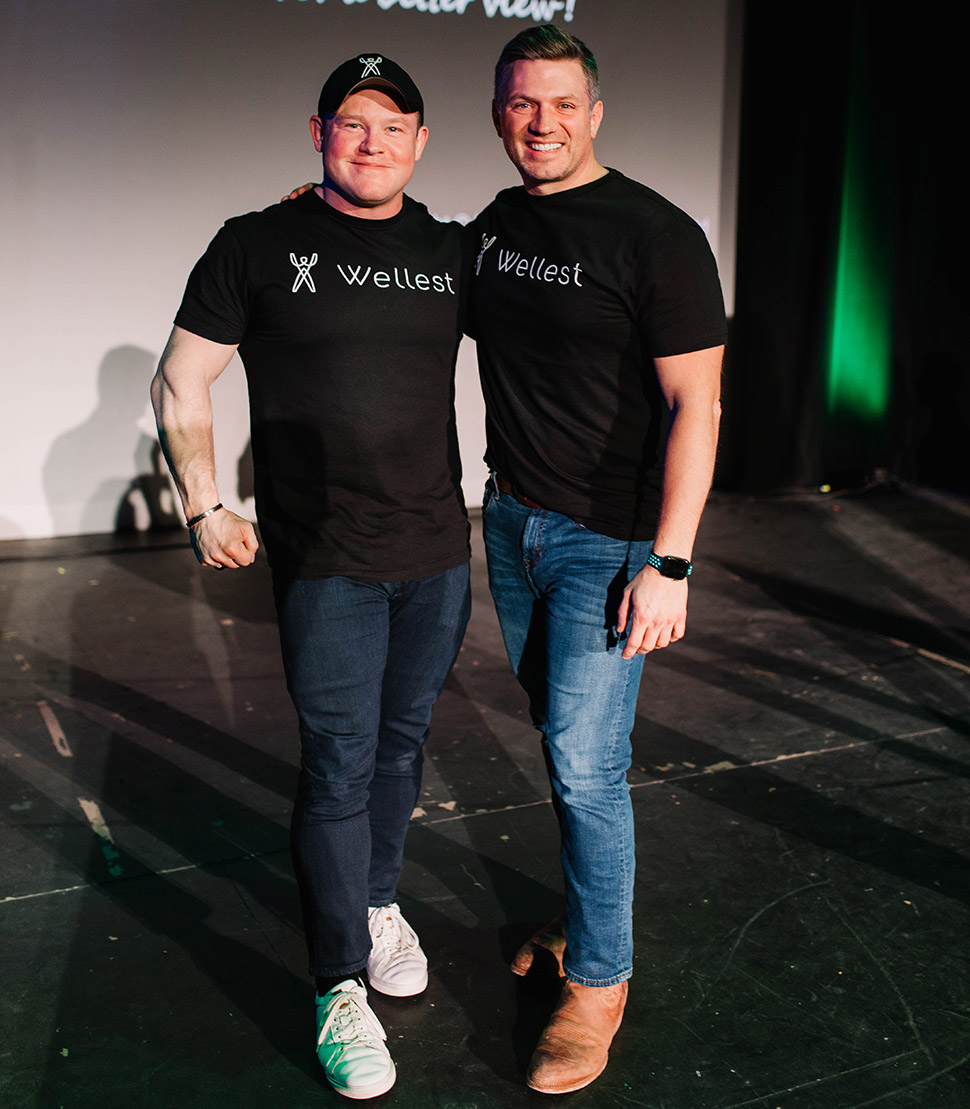
Dave Sekowski, Wellest (left)
Wellest is first focused on targeting subscription software solutions in the clinics market, which is currently worth $16 billion, the founder said.
With clinical efficacy established, he plans to move on to corporate wellness and, eventually, the $110 billion preventative healthcare technologies market.
Clinics concentrating on metabolism, such as endocrinology and diabetes, are a first priority for Wellest to be the “first user-obsessed and conditioned agnostic solution” for preventative and clinical care. “Within one week of starting cold outreach to these doctors, we have seen conversion rates that are 15 times higher than the industry average, proving to us that there’s a desperate need for a technology solution like Wellest,” Sewkowski said.
Wellest’s first clinical pilot will begin in Fort Worth at UNTHSC in Q1 2023 to help increase the number of patients who can get off insulin by ten times.
 STRAFFR
STRAFFR
Germany
Founded 2018
Stefan Weiss, CEO
The next generation of smart fitness equipment, including a smart resistance band with professional training instructions
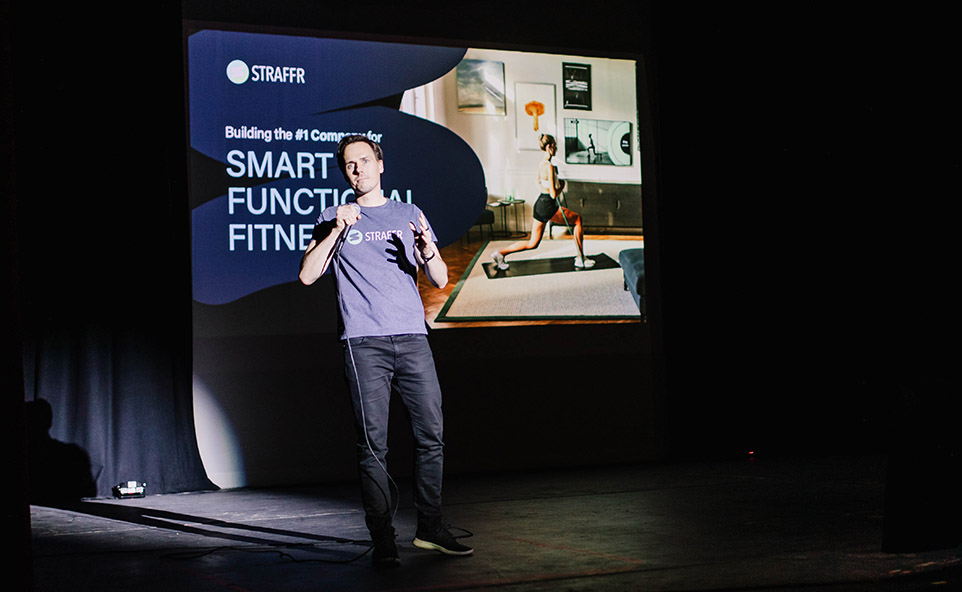
Stefan Weiss, Straffr
As a competitive athlete, Stefan Weiss knows the value of staying active and motivated—but also understands that many current solutions to strength training can be costly, time-consuming or inaccessible.
“We’re always busy,” the founder said. “And let’s be honest, are you always motivated to stay fit? Do you always see and feel that progress that you want to have? Or is time and accessibility a limiting factor to reaching that fitness goal? It’s not easy.”
Strength training is one of the most important types of exercise. He ticks off the options: Bodyweight training is the most portable, but not very intelligent. Gyms are a bit smarter since you can see progress over time, but they require you to physically drive there. Then there’s connected fitness—billion-dollar companies have created smart spinning bikes and treadmills that offer interactive, engaging experiences with pro coaches on demand. And you always have access to them, making them engaging and super cool, he says.
The athlete, who is also an engineer, said STRAFFER builds products just like that. “But we do things a little bit differently,” he said. “On average, we weigh 150 pounds less, and we cost $2,800 less.”
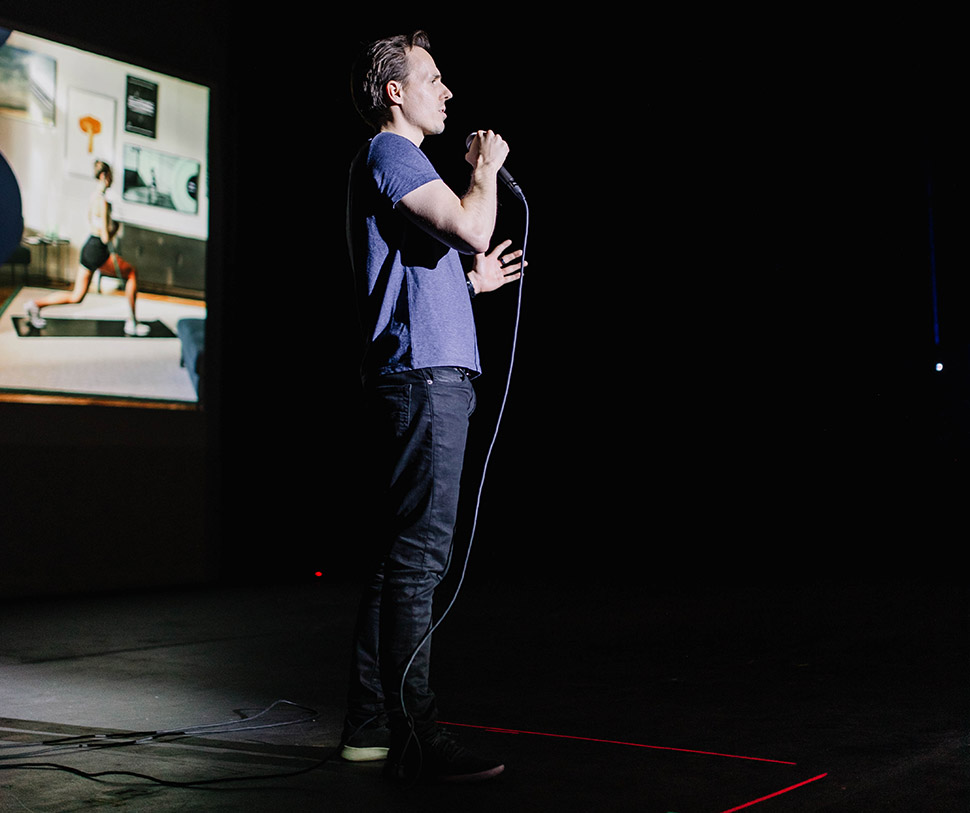
Stefan Weiss, Straffr
Straffr created the world’s first smart resistance band — an innovative device that fits in your pocket and can track power output and range of motion for every move, he says. “It works like magic because the whole band is a sensor,” he said. The band, which can connect to your TV, can correct your pace if you’re going too fast or too slow and give feedback—just like having a personal trainer right there with you.
“We have built a whole ecosystem,” Weiss said. “As a service, we provide science-backed functional training so that you can stay stronger for longer. Software that is motivating and hardware that is smart, portable, and affordable.”
So far, some 4,000 people have bought STRAFFR and the company has brought in $300,000 in sales since its launch last year in Germany. Through Techstars, he says, it’s bringing its tech to the U.S.
 RecovrHealth
RecovrHealth
Nashville, TN
Founded 2022
Jonathan Truong, CEO and co-founder
Bridging the pediatric therapy gap by turning standard exercises into fun and engaging virtual reality games
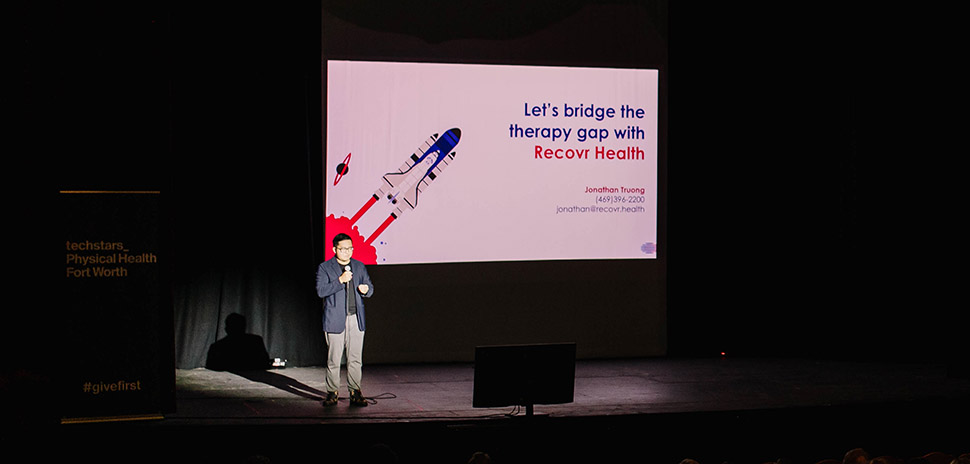
Jonathan Truong, RecovrHealth
From a young age, Tampa-based RecovrHealth’s co-founder and CEO, Jonathan Truong, lived life in and out of physical and occupational therapy due to his meningitis at age 7 and a stroke at age 9. Despite this, he was not a compliant patient—something he has in common with 70% of patients who do not complete their home exercise programs.
“That’s where we come in—we gamify pediatric, physical, and occupational therapy by really transforming their home exercise programs with computer vision-based games. Now, this is to increase compliance, improve outcomes, and increase new revenue streams such as remote therapeutic monitoring,” Truong said.
That can improve compliance and outcomes—and increase new revenue streams such as remote therapeutic monitoring, according to the co-founder.
There are tools out there in the market, but they aren’t that effective, he says. Even less so in pediatrics. With RecovHealth, “patients are playing our games,” he says. “We’re able to see whether or not they’re actually doing their exercises and be able to show that objective data for both the therapist and the parents.”
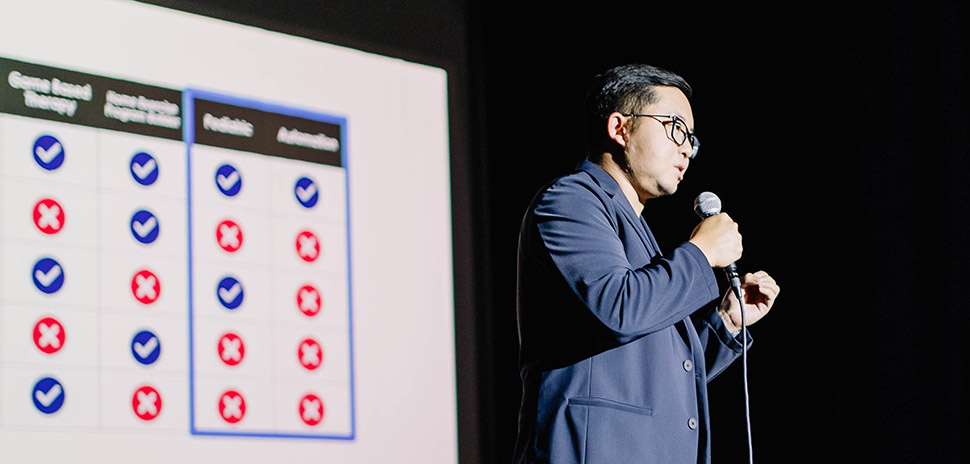
Jonathan Truong, RecovrHealth
The industry is ripe for disruption, the founder said, pointing to a $47 billion industry for the PT/OT service and $19 billion for outpatient services.
Truong plans to focus first on outpatient care, then school systems, and ultimately, going employer/ payor-sponsored plans.
RecovrHealth, which just started a pilot at Methodist Hospital, has made strong headway with hospitals and outpatient care, according to the co-founder. Truong says the company currently has eight in its pipeline, three letters of intent, and one customer with three different locations. Truong projects a total of $237,000 in revenue.
 GoManda
GoManda
Founded 2016
Austin, TX
Celest Austin, CEO and founder
Strength-based learning system for kids that builds social skills through building vocabulary
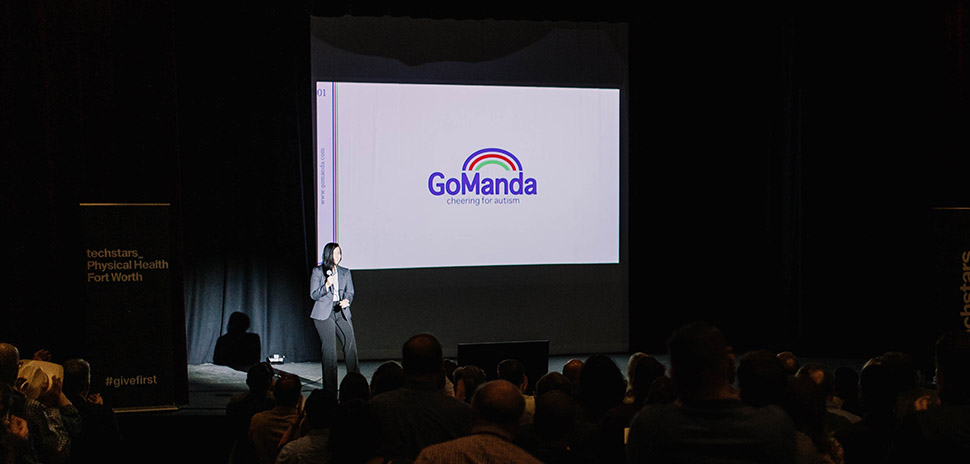
Celest Austin, GoManda
Growing up with an autistic sister, Amanda, had a profound impact on Celest Austin. From a young age, she noticed that her sister had a very different way of learning and processing information, and Austin committed to supporting her and understanding autism. After pursuing a medical degree and Ph.D. to learn everything she could about it. Then she realized she had it right all along: autism is just a different way of learning.
Austin also discovered there aren’t a lot of resources to tailor for that learning style, “which explains why close to 60 percent of autistic children struggle with basics like vocabulary comprehension.”
The founder says that vocabulary comprehension is the very foundation of all communication—and it’s how we connect with our world.
“The resources we’re using right now are flashcards, typically handmade by educators. And we’re not just talking about some flashcards; we’re talking about hundreds and hundreds, and maybe even thousands of flashcards to teach one autistic child,” she said.
That’s a logistical nightmare, she says, and “an impossible task until now with GoManda.”
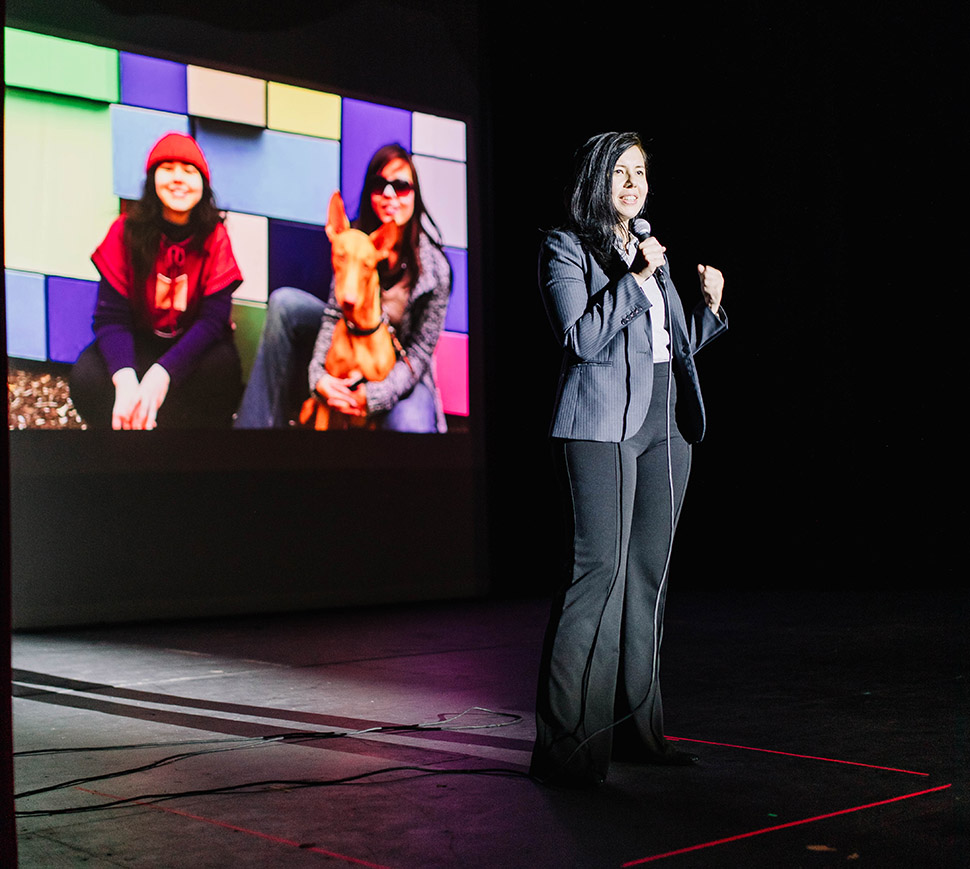
Celest Austin, GoManda
GoManda’s solution is a platform they call the “Netflix for vocabulary,” providing a bank of nouns as well as resources for teaching different colors, textures, materials, and even graphics. It’s an approach that’s proven “incredibly effective,” with some students showing a 400% increase in vocabulary score after just five weeks with GoManda, she notes.
The founder has worked with school districts to shape the product that helps autistic students thrive. This year, she says, “we’re generating revenue with school district contracts in two states — one of those being in Texas, where we’re based. Now the startup is eying the 18,000-plus school districts in the US, which is a $3.1 billion industry to tackle, according to the founder. Austin says GoManda’s product is superior and saves time and money for educators.
“We’re loved by schools, therapists, and even doctors, who all say the same thing: We’re addressing something fundamental, and we’re doing it the right way,” she said. Her passionate team, which includes autistic individuals, has over 50-plus years in childhood and autism education combined.
The founder says the startup is on track to fulfill its vision of “expanding GoManda beyond autism to children of all learning differences across the globe. “Because at the end of the day, I want everyone to have a cheer just like I did those years ago for my sister with “Go Manda,” said Austin.
 Articulate Labs
Articulate Labs
Founded 2012
Dallas, TX
Josh Rabinowitz, CEO and co-founder
Mobile wearable medical device that provides accelerated rehabilitation for knee related injuries and pain
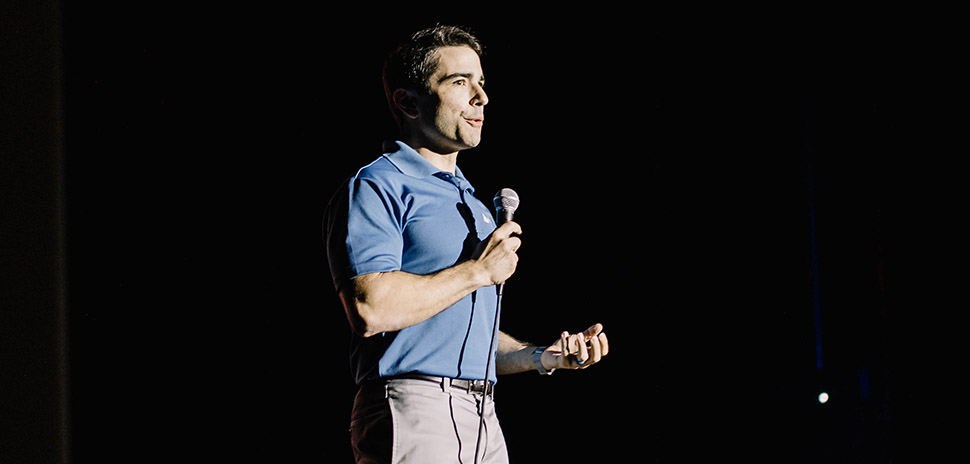
Josh Rabinowitz, Articulate Labs
Josh Rabinowitz, co-founder and CEO of Dallas-based Articulate Labs, is on a mission to revolutionize physical rehabilitation and make it more accessible to those in need. “We do what we do because movements—the ability to walk, the ability to use our bodies is so essential to our identities, our role in this world,” he said.
Rabinowitz’s partner and co-founder, Herbie Kim, knows firsthand the challenges of undergoing physical therapy and making it to all of the necessary appointments. Kim, co-founder and chief science officer of Articulate Labs, developed knee osteoarthritis as an indirect result of losing his right leg in a motorcycle accident. Seeing Kim struggle with complications after the accident, Josh left a career in politics to help Kim, and others struggling with debilitating limb injuries.
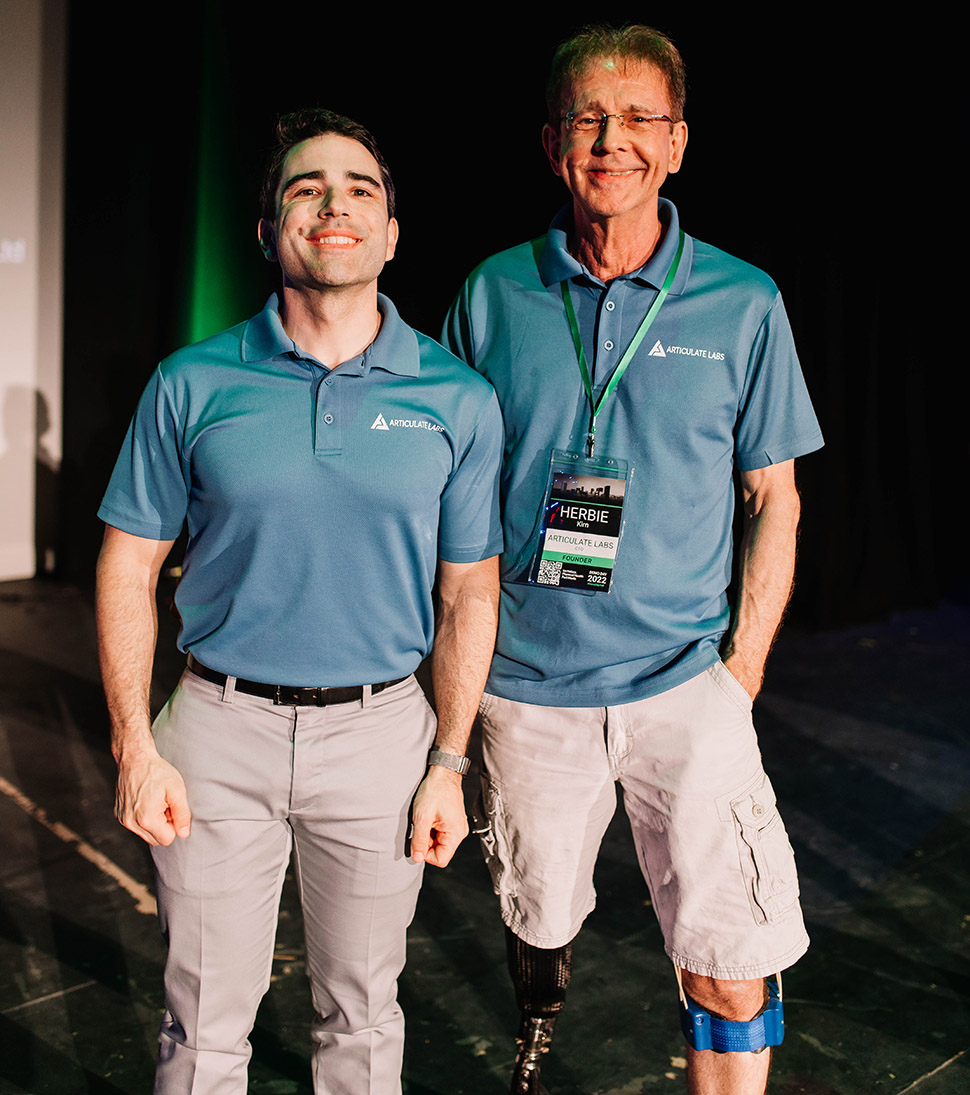
Josh Rabinowitz and Herbie Kim, Articulate Labs
Kim found physical therapy that focused on strengthening the muscle around that joint to be highly effective, but couldn’t make it all of his physical therapy commitments due to work and family commitments.
That’s a very common situation, says Rabinowitz. “There are over 15 million in the US who are symptomatic and seeking treatment for knee osteoarthritis, tens of millions more around the world – very few of whom were ever actually able to make it to all their physical therapy sessions or who can make use of their home-based regimens.”
The co-founders were inspired: “If the patient can’t come to physical therapy, we should try to bring it to them.”
Articulate Labs developed a wearable medical device that uses neuromuscular electrical stimulation to help people with knee osteoarthritis improve their strength and mobility, Rabinowiz says. The device integrates the stimulation with the user’s everyday movements, turning activities like walking the dog or getting in and out of the car into muscle-strengthening exercises.
According to CEO Josh Rabinowitz, the goal is to make physical therapy more accessible and convenient for patients, even when they can’t make it to a clinic.
The device also allows providers to track patient compliance and progress, helping them to communicate with their patients and provide better care, according to the CEO. Articulate Labs aims to provide a near doubling in strength recovery for those using their devices, while also offering additional revenue streams for providers and reducing the overall cost of care for payors.
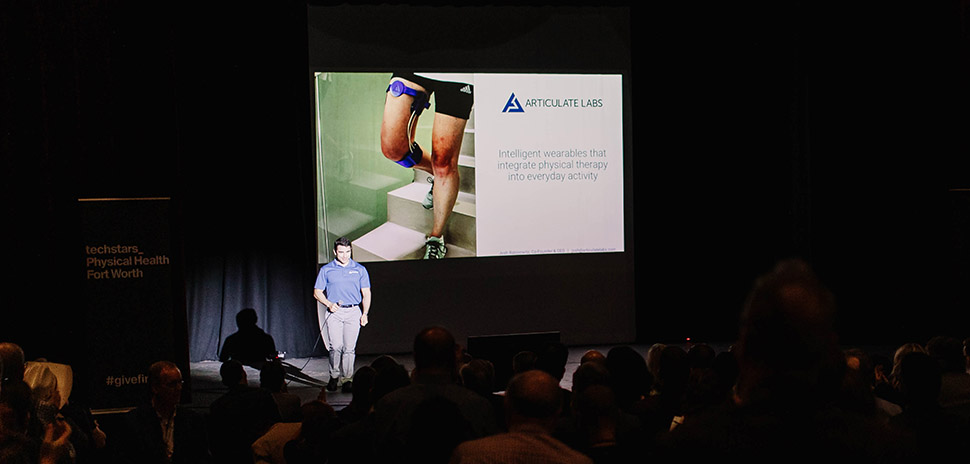
Josh Rabinowitz, Articulate Labs
Rabinowitz and his team are starting their efforts in Texas, where they’ve established relationships with durable medical equipment suppliers. They plan to wholesale their devices to these suppliers, who will then rent or resell them to outpatient surgical centers and physical therapy clinics. In this way, both the durable medical equipment suppliers and the clinicians can make reimbursements through the rental or remote therapeutic monitoring elements of the devices.
As the company expands, it hopes to bring its technology to a wider audience and make a significant impact on the lives of those suffering from knee osteoarthritis.
Articulate Labs has experienced significant growth during its time with Techstars, Rabinowitz said. The team has “basically doubled” with new operations and commercialization leads coming in to work with the founders and the company’s scientific advisory board. The company has also established relationships with several new facilities, including the UNT Health Science Center and Texas Health Resources, Clearfork. These relationships may involve letters of intent, pilot studies, or other commitments, he said.
Rabinowitz says that the “value of strength to us is not in what’s visible or what’s measurable, but in the ability to follow through on duty of care—to have the strength to lift up your kid or be able to walk your daughter down the aisle without pain, and that’s the type of thing that we believe we can provide to others.”
 Stabl
Stabl
Founded 2021
Hamza Shaikh, CEO and co-founder
Patient-centric post-operative rehabilitation platform that uses live motion analysis to facilitate daily rehabilitation sessions and provide data-driven insights
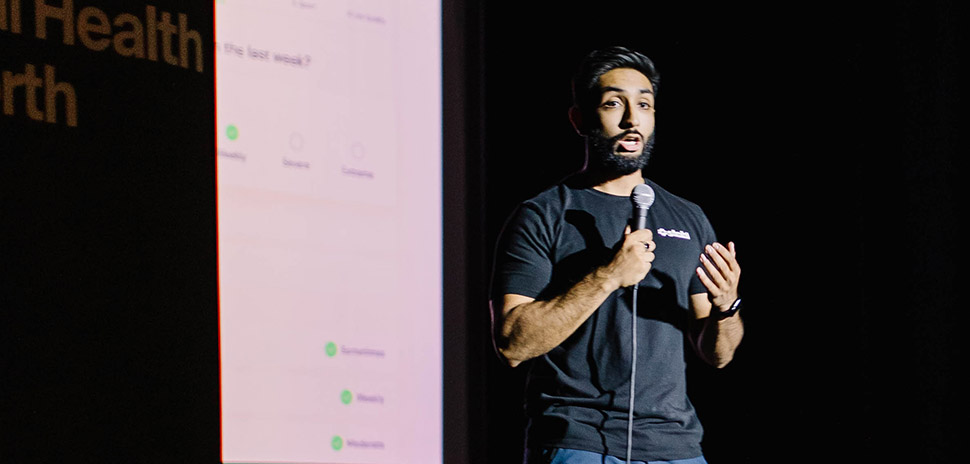
Hamza Shaikh, Stabl
“Today, there will be 20,000 orthopedic surgeries performed, contributing to a total of 7 million per year,” Hamza Shaikh says. Of these patients, 80% are discharged on the same day of their surgery. Traditionally, patients are given a single sheet of paper with exercises to perform to recover from their operation, but only 30% of these protocols are completed by patients.
That low adherence rate can lead to significant adverse health effects, including the need for revision surgery. The cost of patient readmissions, federal fines, and treating revised patients is costing hospitals $36 billion each year, Shaikh says.
Stabl was launched to help patients recover at home while still staying connected with their clinical team, the co-founder says.
Using machine learning and artificial intelligence, Stabl tracks a patient’s joints as they perform their recovery exercises at home, according to the demo. The platform collects data on exercise adherence, biomechanics, and overall joint range of motion. It also uses daily engagement forms to collect patient-reported outcome measures, which are analyzed to identify and address any readmission risks, Shaikh says.
So far, patients using Stabl’s platform have shown 80% adherence to the protocol, which is nearly three times higher than the industry average, he notes. They have also scored 11 points higher on clinical outcome scores and have been able to transition at least one follow-up visit to telehealth with the data provided by the platform’s remote monitoring.
Stabl’s success can be attributed to its focus on addressing research barriers around patient adherence when building the platform.
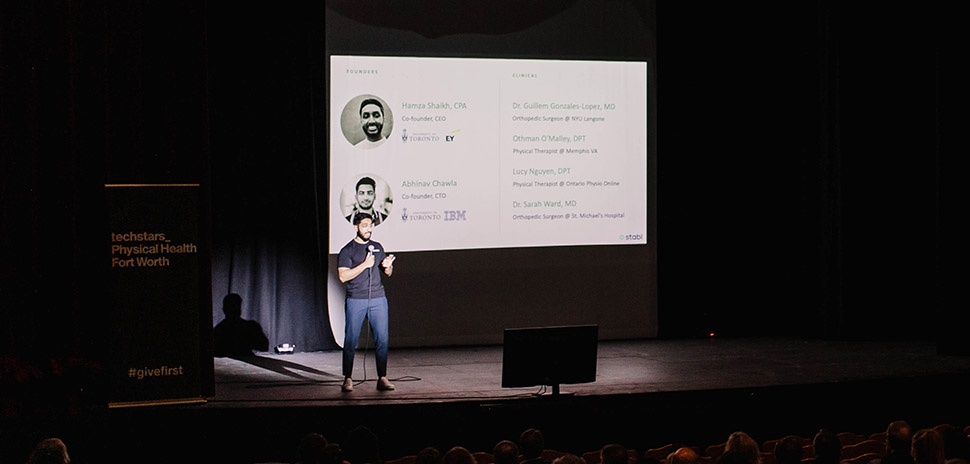
Hamza Shaikh, Stabl
Stabl is sitting at the center of three massive healthcare megatrends, Shaikh says.
The co-founder ticks off the trends: First, nearly early 80 percent of patients prefer their follow-up visits to be done via telehealth. Second, clinicians are adopting digital health solutions faster than ever before. And third, the sheer volume of orthopedic surgeries is rising exponentially, meaning our platform’s the only one that can address the increased demand by patients, but a lack of supply by clinicians.
“Our success with our patients can be attributed to the research barriers around patient adherence that we identified and uniquely addressed when building out our platform,” Shaikh said.
Its insurance-reimbursable model has also caught the eyes of its earliest customers, the co-founder says. “It’s allowed us to align incentives between all the users and gain early traction which we hope to utilize in the coming years as we grow,” Shaikh said.
The company saw traction prior to the Techstars program. But now, Shaikh says, “we’re looking to take over in digital health.”
In addition to a research study at NYU and a pilot at the VA Medical Center, Stabl is in the process of closing and contracting a pilot with “the largest sub-specialty group right here in North Texas.”
Shaikh also revealed its biggest milestone yet: Stabl successfully raised an oversubscribed pre-seed funding round, bringing in our first million dollars of fundraising. “With the help of this, we’re going to be able to execute on all of our goals and build out our team.”
Its goal is simply stated: to revolutionize digital health, he says.
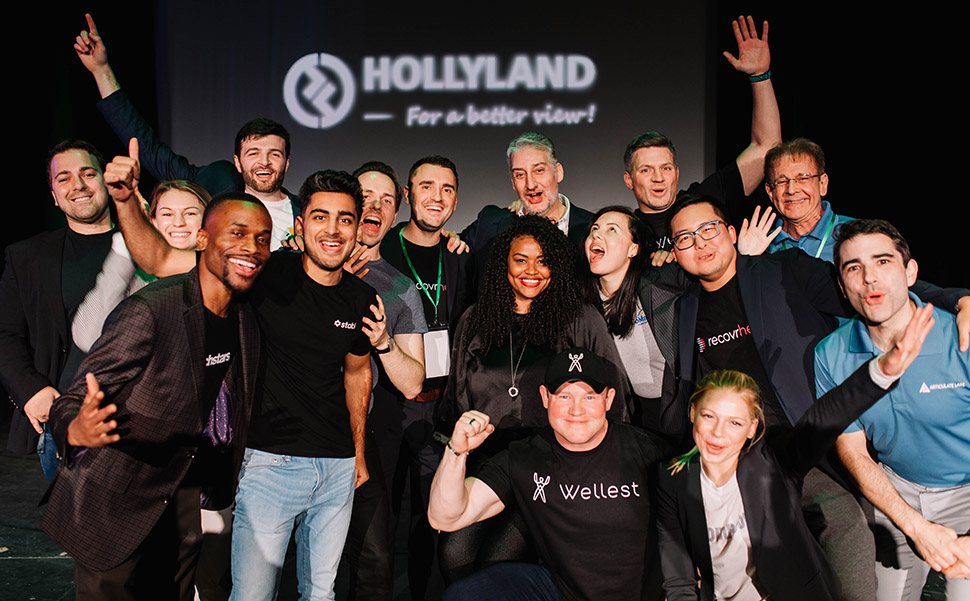
The Techstars Physical Health cohort 2022
Photos provided by Techstars Physical Health Fort Worth.
Sandra Engelland and Lance Murray contributed to this report.
![]()
Get on the list.
Dallas Innovates, every day.
Sign up to keep your eye on what’s new and next in Dallas-Fort Worth, every day.

